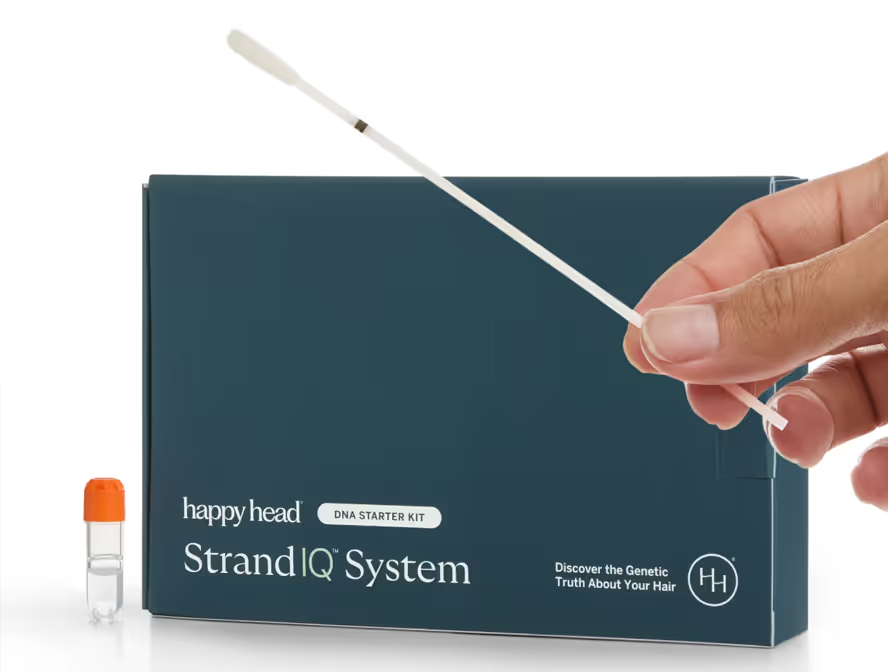Vitamin B5 (pantothenic acid) is more than just a common B-vitamin—it’s a metabolic powerhouse. It fuels energy production and supports coenzyme A synthesis, which drives fat metabolism, hormone production, and scalp health. When vitamin B5 levels are optimized, hair grows stronger, retains moisture, and resists breakage. But when your genetic profile suggests reduced B5 conversion or retention, hair may become dry, brittle, or thin—and your scalp may react more strongly to stress or poor nutrition.
If you carry genetic variants that impair vitamin B5 processing, your body may not use this nutrient efficiently. This can cause chronic undernourishment of hair follicles, especially during periods of stress, alcohol consumption, or low-quality dietary intake. Fortunately, targeted nutrition and supplementation like the plans offered at Happy Head can help restore your scalp’s natural defenses.
Understanding the Role of Vitamin B5 in Hair and Hormone Metabolism
Pantothenic acid is critical in producing coenzyme A, a molecule that assists in synthesizing and metabolizing fats and hormones—including cortisol, your main stress hormone. Chronic stress, poor diet, or alcohol use can compound B5-related deficiencies, leaving your scalp dry, irritated, and more prone to flaking or hair thinning.
Personalized Recommendations Based on Risk Level
These personalized recommendations are designed to help you maintain optimal vitamin B5 levels based on your Happy Head StrandIQ genetic profile. Because B5 plays a key role in energy metabolism and hormone regulation—including stress hormones—supporting its function can help improve scalp resilience, hair vitality, and overall skin comfort.
Low Risk: Maintain Through Diet
If your genetic profile places you at a low risk for vitamin B5 deficiency, then simple tweaks may be all you need to keep your scalp health on track:
- Food-first focus
Incorporate vitamin B5-rich foods like organ meats (liver, kidney), eggs, shellfish, salmon, milk products, and avocados to maintain healthy levels. - Avoid alcohol
Even occasional alcohol intake can hinder B5 absorption and reduce its bioavailability. - Stay consistent
A balanced, nutrient-dense diet is often sufficient to meet needs if no genetic impairment is present.
Medium Risk: Boost Intake and Monitor Symptoms
If your StrandIQ analysis found that you are at a moderate risk for vitamin B5 deficiency, or you notice that your locks are feeling dry and brittle, then more advanced interventions may be needed:
- Add functional foods
Focus on B5-rich options such as fish, eggs, and avocados. Add fortified cereals or nutritional yeast for additional support. - Skin and scalp products
Inform your provider if using skincare products with pantothenic acid, especially if combining with oral supplementation. - Watch for symptoms
Signs of B5 deficiency include fatigue, scalp irritation, tingling, or burning feet. Seek professional guidance if these occur.
High Risk: Take Actionable Steps Toward Supplementation
If you’ve been identified as being at a genetically higher risk for B5 deficiency, then more serious measures may be required:
- Prioritize high-B5 foods
Consume a diverse mix of liver, salmon, dairy, and eggs. For plant-based support, add mushrooms, lentils, and sunflower seeds. - Eliminate interference
Avoid alcohol and limit processed foods that deplete vitamin stores or stress liver detox pathways. - Medical supplementation
Speak with a Happy Head healthcare provider about pantothenic acid supplements if symptoms persist despite dietary efforts. - Stress Support
Since B5 influences cortisol regulation, consider stress-reducing activities like breathwork, magnesium intake, or adaptogenic herbs. - Gut health check
Healthy digestion is essential for absorbing water-soluble vitamins like B5. Consider probiotics or digestive enzymes if you experience bloating or IBS-like symptoms.
Vitamin B5 and Genetic Testing
If you’ve discovered that your genetic variants reduce your ability to process B5 effectively, you’re not alone. By focusing on functional foods, reducing lifestyle-related depletions (like alcohol), consulting with your doctor, and using supplements as needed, you can better support scalp integrity and hair vitality.
Resources
StrandIQ SNP Marker Count: 21
StrandIQ Genes for Trait:
ABHD1, ACBD4, AGPAT1, CHKB, CPT1B, CPT1C, DCAKD, ECI2, ECI2-DT, EGFL8, HLA-DMB, LCLAT1, MIR6721, NMT1, PLCD3, PPT2, PREB, PRSS53, STX4, TEX56P, VKORC1
References:
Feofanova, E.V., et al. (2020). A genome-wide association study discovers 46 loci of the human metabolome in the Hispanic Community Health Study/Study of Latinos. American Journal of Human Genetics, 107(5), 849–863. PMID: 33031748.
Rhee, E.P., et al. (2013). A genome-wide association study of the human metabolome in a community-based cohort. Cell Metabolism, 18(1), 130–143. PMID: 23823483.
This content, including StrandIQ™ DNA analysis reports and any Happy Head products and/or services referenced therein, is for informational and cosmetic purposes only. It is not intended to diagnose, treat, cure, or prevent any disease. This content does not constitute medical advice and should not be used to make healthcare decisions. References to prescription treatments are educational in nature. Always consult a licensed healthcare professional for any medical concerns or treatment decisions.










.avif)

